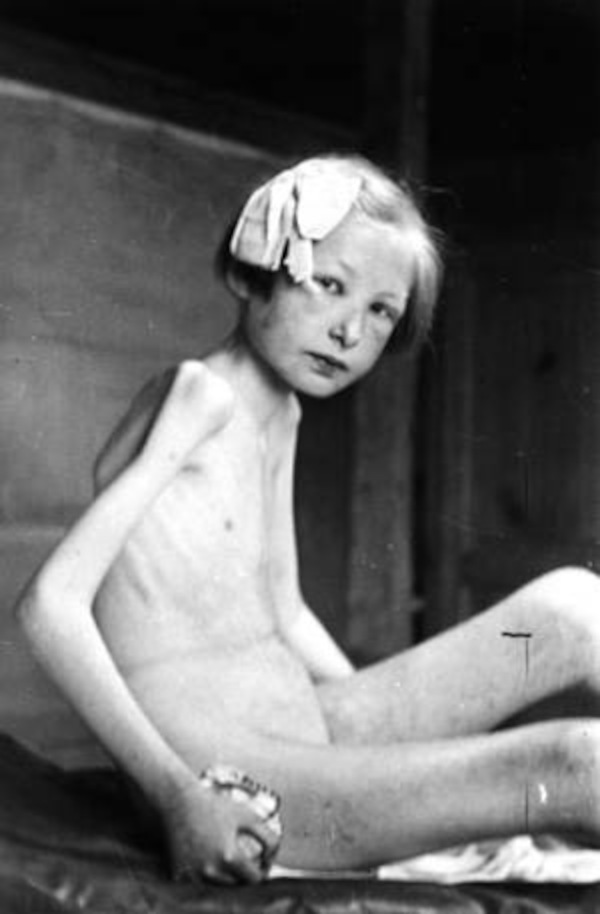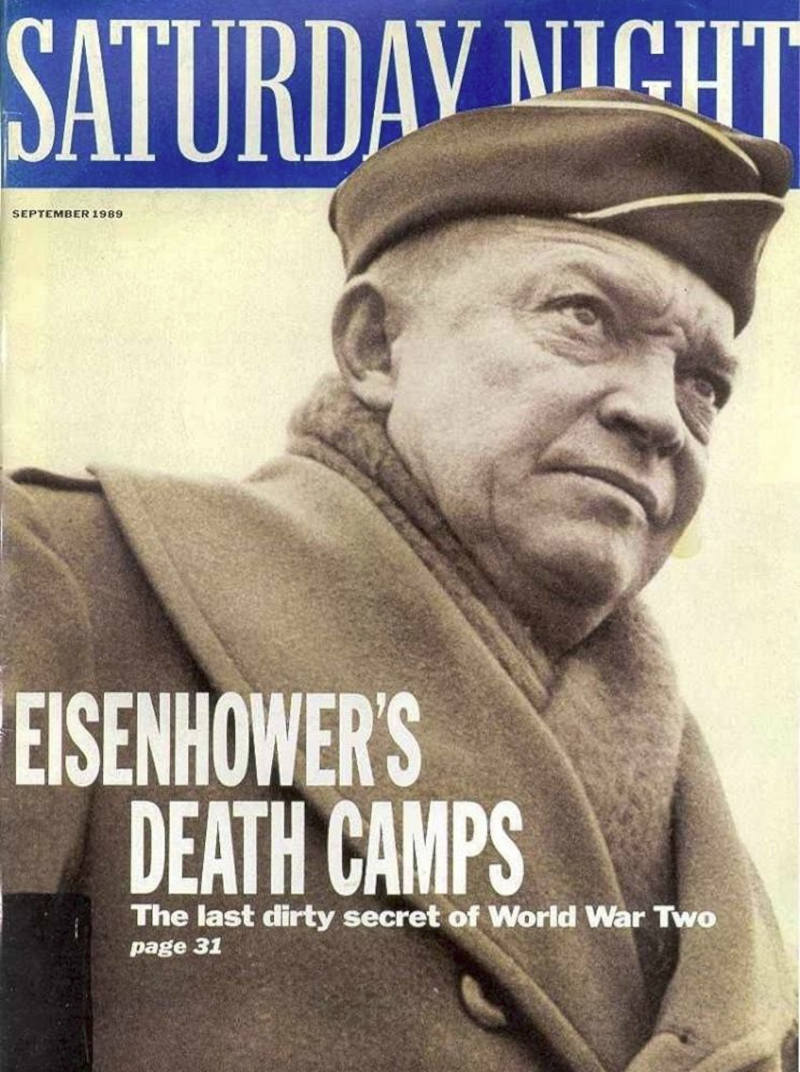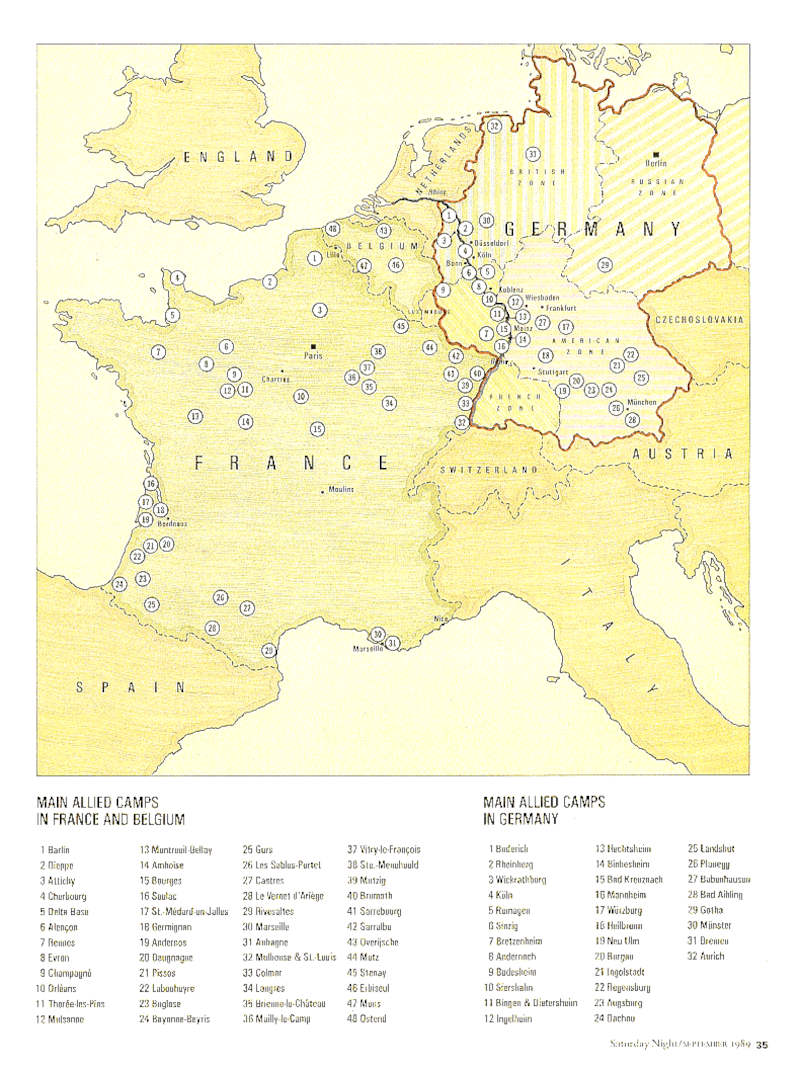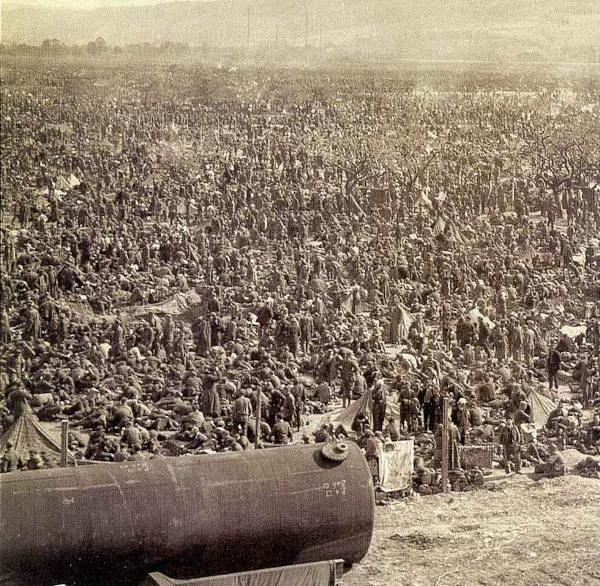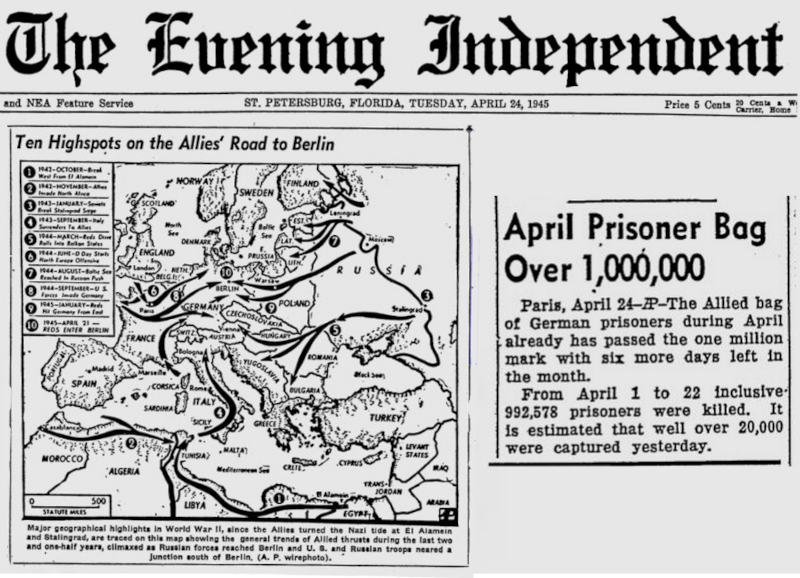
Germanic woman raped and beaten by Allied Forces.
Hellstorm
Continued 2/2
DEFEAT IN THE WEST
In the Spring of 1945, as Berliners prepared to defend the capital from the encircling Soviet army, Germans to the west also fought to halt the Allied tide. Unlike the howling savagery to the east, fraught with nightmarish ferocity, defeat in the west came methodically, relentlessly and, judged by the standards of the east, almost silently. As the Western front crept closer, civilians anxiously awaited the Allied arrival. Unlike the terrified trekkers to the east, relatively few Germans in the west abandoned their homes. The racial and cultural ties with the enemy, particularly the Americans, were simply too strong to arouse the same terror as the Soviets did. Far from fleeing the advancing Allies, many civilians actually ran to greet them. Little did the Germans realise that because of a decade of Jewish propaganda, the Americans were perhaps even more hate — filled than the Soviets. Unlike the wild and almost unimaginable Red Army, US military commanders might have easily prevented crimes committed against helpless civilians had they only willed it. In most cases, however, they did not.
Leading the charge against the German people was General Dwight D. Eisenhower, a man whose hatred of all things German was well known. In much the same vein as Stalin and Roosevelt, Eisenhower advocated the outright massacre of German army officers, Nazi Party members and others. In all, according to the Allied commander, at least 100,000 German leaders should be “exterminated.” Not surprisingly, such sentiment from above quickly filtered down. “The only good German is a dead German,” became the pervasive sentiment. “Take no prisoners,” was the tacit understanding. By the tens of thousands, captured or surrendering Germans were simply slaughtered on the spot. As American forces swept toward Munich in late April 1945, most German guards at the concentration camp near Dachau fled. Despite signs at the gate warning, “No entrance — typhus epidemic,” several hundred German soldiers were ordered to the prison to maintain order and arrange the transfer of over 30,000 prisoners to the Allies. When the Americans reached Dachau the following day, they were horrified by what they saw. Outside the prison sat rail cars full of diseased and starved corpses. Inside the camp, a room piled high with naked and emaciated bodies was also discovered. Unhinged by the nightmare, certain that Dachau was proof of the atrocities they had heard so much about in America, officers turned their enraged troops loose on the now disarmed German soldiers.
A US soldier: The men were deliberately wounding guards. A lot of guards were shot in the legs, so they couldn't move. They were then turned over to the inmates. One was beheaded with a bayonet. Others were ripped apart limb by limb. While the tortures were in progress, a lieutenant forced over 300 captive Germans up against a wall, planted two machine-guns, then ordered his men to open fire. Those still alive when the fusillade ended were forced to stand amid the carnage while the machine-gunners reloaded. In all, over five hundred helpless German soldiers were slaughtered in cold blood. As a final touch, the citizens of Dachau were forced to bury the thousands of corpses in the camp, thereby assuring the death of many more from disease. Few Americans noticed because few cared, but conditions in German cities and towns were not much better than that at Dachau. Because of the round-the-clock American and British air attacks week after week, very little food and almost no medicine was arriving anywhere in Germany. Virtually none reached the numerous concentration camps, where, during the last days, disease and starvation swept away the inmates by the thousands. The incident at Dachau was merely one of many massacres committed by US troops.
US Soldier: We had been held up at a little town. We were supposed to just walk through it, and the Germans stopped us dead. We just couldn't crack it. Eventually artillery came in, sort of levelled the houses. They finally surrendered, and they came out, and sort of lined up. Per usual, no one knew what was going on. We had a new battalion commander, just graduated from West Point, and he lined them up, and said, “I want you to shoot them.” And I was horrified. Quite a few of us were horrified. And I went to him and told him, you know, that this was against all international law, and humanity. My good buddy, who I'd spent so much time with, grabbed me, and said, “This nut will shoot you. You better knock this off.” And he got enough guys, and they shot these… about twenty-five prisoners. It was a terrible thing to see, and I talked to a lot of my buddies who had shot these guys, and they were horrified too. Unaware of the deep hatred the Allies harboured for them, when proud SS units surrendered, they naively assumed that they would be accorded respect as the unsurpassed fighters that they had proven to be. As soon as they were disarmed, most were slaughtered where they stood. For those members of the German military lucky enough to survive capture, death often awaited behind the lines, where thousands more perished. With General Eisenhower turning a blind eye to the Geneva Convention, only the threat of retaliation against Allied POWs still held in Germany prevented a massacre of prodigious proportions. Soon after US combat soldiers moved out of a community and the rear echelon troops moved in, the reality of occupation became clear to the German citizens. The second wave of soldiers, wanting to experience a bit of war on their own, took out their aggression on the helpless Germans by looting, raping, killing, and destroying. In many towns, the invaders unlocked jails, prisons, and concentration camps and invited the inmates to join in the revelry.
Amy Schrott: They just opened up the camps and let them go. The Russians and Poles were looting the houses and killing the shopkeepers. Then they began raping the girls. Similar mayhem engulfed most towns in Western Germany as Americans and British pushed onward.
US sergeant: Our own Army and the British Army have done their share of looting and raping. We, too, are considered an army of rapists. Although brutal rapes persisted against defenceless females, the Allied troops quickly discovered that hunger was a powerful incentive to sexual surrender. Although sex could be bought for a bit of food, a cigarette or a bar of soap, some victors preferred to take what they wanted, whenever and wherever they pleased. American soldier: Hunger made German women more available, but despite this, rape was prevalent and often accompanied by additional violence. In particular, I remember an eighteen-year old woman who had the side of her face smashed with a rifle butt and was then raped by two GIs Even the French complained that the rapes, looting and drunken destructiveness on the part of our troops was excessive. Despite the numerous atrocities committed on the western front, such savagery never became officially sanctioned. Considering the blood-thirsty propaganda from the primarily Jewish-owned media, as well as the active incitement of their political and military leaders, the average British and American soldier comported himself amazingly well, and certainly far, far better than his Soviet counterpart. Although the Allies in the West might have easily pushed on to Berlin, they were ordered to halt just short of their goal. As a token of their great love and gratitude, Roosevelt and Churchill had already awarded the German capital to Stalin as a prize. After days of hopeless fighting in which little boys fought, and all too often died, like men, Berlin was finally overwhelmed on May 2nd. And with the suicide of Adolf Hitler, the war effectively ended. Now that there was virtually no chance for reprisals against Americans held in German POW camps, Eisenhower's pathological hatred of Germans was given free rein.
DEATH CAMPS:
With the final capitulation in May 1945, the supreme allied commander found himself in control of over five million ragged, weary, but living, enemy soldiers. Since Eisenhower could not kill more armed Germans in war, the American desk general decided to kill disarmed Germans in peace. Because the Geneva Convention guaranteed POWs the same food, shelter and medical attention as their captors, Eisenhower simply circumvented the treaty by creating his own category for prisoners. Under this reclassification, German soldiers were no longer considered POWs, but DEFs — Disarmed Enemy Forces. With this sleight-of-hand, and in direct violation of the Geneva Convention, Eisenhower could now deal in secret with those in his power, free from the prying eyes of the outside world. Even before the war's end, thousands of German POWs had died in American captivity from starvation, neglect, and, in many cases, outright murder. With the German surrender and the threat of retaliation against Allied POWs entirely erased, deaths in the American concentration camps accelerated dramatically. While tens of thousands died of starvation and thirst, hundreds of thousands more perished from overcrowding and disease.
“God, I hate the Germans…”.
German prisoner: It's incomprehensible to me how we could stand for many, many days without sitting, without lying down, just standing there, totally soaked. During the day, we marched around, huddled together to try to warm each other a bit. The latrines were just logs flung over ditches next to the barbed wire fences. To sleep, all we could do was to dig out a hole in the ground with our hands, then cling together in the hole. Because of illness, the men had to defecate on the ground. Soon, many of us were too weak to take off our trousers first. So, our clothing was infected, and so was the mud where we had to walk and sit and lie down. There was no water at all at first, except the rain. More than half the days we had no food at all. On the rest, we got a little K ration. I could see from the package that they were giving us one tenth of the rations that they issued to their own men. I complained to the American camp commander that he was breaking the Geneva Convention, but he just said, “Forget the Convention. You haven't any rights.” Within a few days, some of the men who had gone healthy into the camps were dead. I saw our men dragging many dead bodies to the gate of the camp, where they were thrown loose on top of each other onto trucks, which took them away. As if their plight were not already hideous enough, prisoners occasionally became the targets of drunken guards who sprayed the camps with machine-gun fire. At one compound, amused guards formed lines and beat prisoners with clubs and sticks as they ran the gauntlet for their paltry rations.
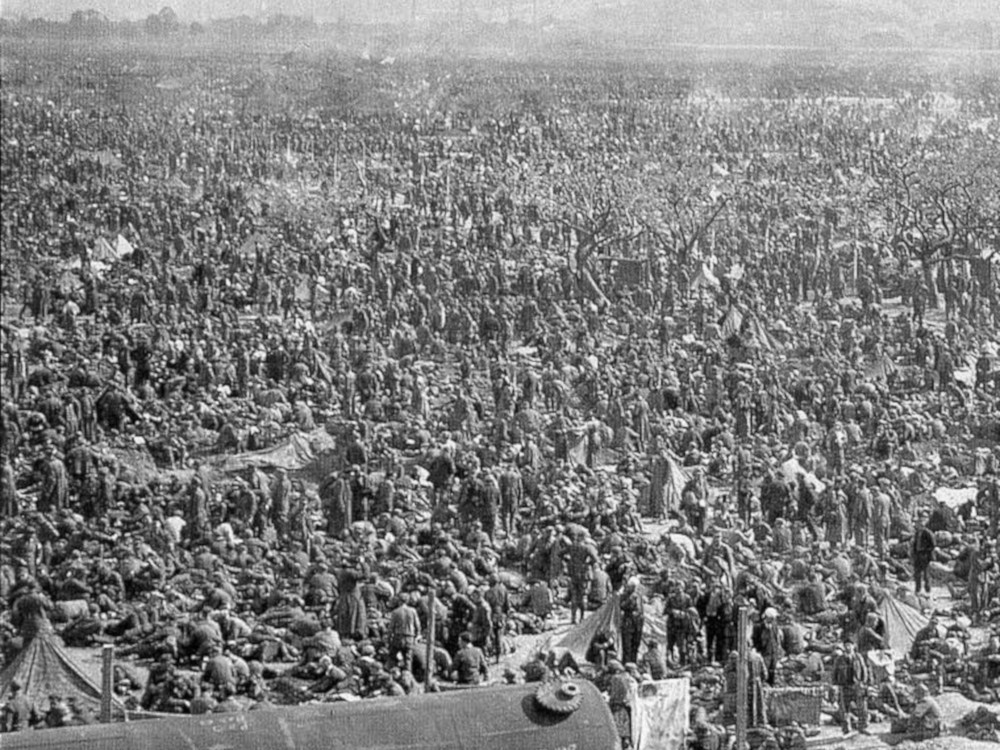
At another camp of 5,200 men, ten to thirty bodies were hauled away every day. Prisoners who did not succumb to hunger or disease often died of thirst. Many men were forced to drink their own urine, even though streams ran a few feet from the barbed wire. There was no lack of food or shelter among the victorious Allies. Actually, American supply depots were bursting at the seams. Instead of allowing even a trickle of this bounty to reach the compounds, the starvation diet was further reduced. Within full view of some camps, Americans would sadistically burn food that they could not eat themselves. Civilians from nearby villages and towns, themselves starving, were prevented at gunpoint from passing their own merge fare through the fence to prisoners. Horrified by the silent, secret massacre, the International Red Cross, which had over 100,000 tons of food stored in Switzerland, tried to intercede. When two trains filled with supplies reached the camps, however, they were turned back by American officers. Many people found no justification whatsoever in the massacre of helpless prisoners, especially since the German government had lived up to the Geneva Convention, as one American put it, “to a tee.”
“When they caught me throwing C- Rations over the fence, they threatened me with imprisonment. One captain told me that he would shoot me if he saw me again tossing food to the Germans … Some of the men were really only boys 13 years of age…Some of the prisoners were old men drafted by Hitler in his last ditch stand … I understand that the average weight of the prisoners at Andernach was 90 pounds…I have received threats … Nevertheless, this…has liberated me, for I may now be heard when I relate the horrible atrocity I witnessed as a prison guard for one of 'Ike's death camps' along the Rhine.”.
The Red Cross reported that ninety-nine percent of American prisoners of war in Germany have survived and were on their way home. Nevertheless, Eisenhower's murderous program continued apace. Some upright generals, such as General George Patton, opposed these murderous measures, but Eisenhower quickly overruled them. While continuing to deny the Red Cross and other relief agencies access to the camps, Eisenhower stressed among his camp commanders the need for secrecy. To prevent the gruesome details from reaching the outside world, and sidetrack those that did, counter-rumors were circulated stating that, far from mistreating and murdering prisoners, camp commanders were actually turning back released Germans who tried to slip back in for food and shelter.
“Starting in April 1945, the United States Army and the French Army casually annihilated one million [German] men, most of them in American camps… Eisenhower's hatred, passed through the lens of a compliant military bureaucracy, produced the horror of death camps unequalled by anything in American history … an enormous war crime.”.
Unlike their capitalist counterparts, the Soviet communists made little effort to hide their crimes. Hundreds of thousands of Germans toiled in the forests and mines of Siberia. The captives were slaves pure and simple and no attempt was made to disguise the fact. For the enslaved Germans, male and female, the odds of surviving the Soviet gulags were even worse than escaping the American death camps. A trip to Siberia was tantamount to a death sentence. What little food the slaves received was intended merely to maintain their strength until they were worked to death. Much the same might be said of the 600,000 German slaves held by the French. Ultimately, no fewer than 800,000 German prisoners died in the American and French death camps. Indeed, Recent estimates place the death toll at upwards of 1.5 million. And thus, in “peace,” did Eisenhower murder at least ten times the number of German soldiers than were killed on the whole Western Front during the whole of the war. With the once mighty Wehrmacht now disarmed and enslaved, and with their leaders, either dead or awaiting trial for war crimes, the old men, women and children who remained in the dismembered Reich now found themselves utterly at the mercy of the victors. Unfortunately, never in the history of the world was mercy in shorter supply.
Additional reading: Timeline of Eisenhower's Post WW2 Death Camps.
THE PURGE:
Soon after their victory in Europe, the Allied purge of Nazi Party members commenced. In theory, “de-Nazification” was a simple transplanting of Party officials with those of democratic, socialist or communist underpinnings. In practice, the purge became little more than a cloak for rape, torture and death. All adult Germans were compelled to register at the nearest Allied headquarters and complete a lengthy questionnaire on past activities. While many nervous citizens were detained then and there, most returned home, convinced that the terrible ordeal was over. For millions, however, the trial had just begun. Few German adults, Nazi or not, escaped the dreaded knock on the door. Many people were arrested multiple times, including Leni Riefenstahl, a talented young woman who was perhaps the world's most artistic film-maker. Because her epic documentaries — Triumph of the Will and Olympia — seemed to glorify not only Germany, but National Socialism, and because of her close relationship with an admiring Adolf Hitler, Leni was of great interest to the Allies. Leni Riefenstahl: Neither my husband nor my mother nor any of my three assistants had ever joined the Nazi Party, nor had any of us been politically active. No charges had ever been filed against us, yet we were at the mercy of the Allies and had no legal protection of any kind. As Leni and others quickly discovered, the “softening up” process began soon after arrival at an Allied prison. Brutally beaten, raped repeatedly, crammed into dark, overheated cells, victims nervously awaited their “interrogations”.
A German man: The purpose of these interrogations is not to worm out of the people what they knew which would be uninteresting anyway, but to extort from them special statements. The methods resorted to are extremely primitive; people are beaten up until they confess to having been members of the Nazi Party. The authorities simply assume that, basically, everybody has belonged to the Party. Many people die during and after these interrogations, while others, who admit at once their party membership, are treated more leniently. Generally, after enduring blackened eyes, broken bones, rape, electric shock to breasts, or, in the case of men, smashed testicles, only those who took their own lives or died during torture failed to sign confessions. Since most intelligence officers accompanying US and British forces were Jewish refugees who had fled Germany in the 1930s, their knowledge of the language and culture was superb.
With old scores to settle, the presence of these men ensured that there would be no mercy shown to Nazis — or any German, for that matter. A young German woman: Both officers who took our testimony were former German Jews. One kicked me in the back and the other hit me. The terrible thing was, the German men had to watch. That was a horrible, horrible experience. That must have been terrible for them. When I went outside, several of them stood there with tears running down their cheeks. What could they have done? They could do nothing. During the Nazi war crimes trial at Nuremburg, almost any method that would obtain a “confession” was employed. Understandably, after several such sessions, even the strongest submitted and signed papers incriminating themselves and others.
In addition to testimony given under torture, those who might have spoken in defence of the accused were threatened with torture and death themselves. Moreover, hired “witnesses” were paid by the Americans to parrot the prosecutions charges. Horrific as de-Nazification was in the British, French and, especially, the American Zones, it was nothing compared to what took place in Poland, behind Soviet lines. In hundreds of concentration camps sponsored by something called the “Office of State Security,” thousands of Germans — male and female, old and young, high and low, Nazi and nonNazi — were rounded up and imprisoned. Staffed and run by Jews, with help from the Poles, Czechs, Russians, and other former concentration camp inmates, the prisons were little better than vast torture chambers where dying was a thing to be prolonged, not hastened. While those with blond hair, blue eyes and handsome features were first to go, anyone who spoke German would do.
For these vengeful camp operators, no torture, no sadism, no depravity, no evil, seemed too monstrous to inflict on those now in their power. Some Germans were forced to crawl naked on all fours and eat their own excrement as well as that of others. Many were drowned in open latrines. Hundreds were herded into buildings and burned to death, or sealed in caskets and buried alive. Near Lamsdorf, German women were forced to disinter bodies from a Polish burial site, then kiss and “make love” to the putrid, rotting corpses. Not surprisingly, the mortality rate at the concentration camps was staggering and of those rare individuals who did leave with their lives, few could any longer be called human. Meanwhile, as the judicial charade was in progress behind prison walls, tortures of another kind stalked the “liberated” German people as the Allied victors enacted their plan to divide, loot, and utterly destroy conquered Germany.
In late 1944, the so-called "Morgenthau Plan” was endorsed by President Roosevelt, making the Jewish prewar demand for German extermination official. Named for Roosevelts Secretary of the Treasury, Henry Morgenthau, but actually conceived by the secretary's top aide, Harry Dexter White — both of whom were Jewish — the program called for the complete destruction of Germany after victory had been won. In addition to the dismantling or destruction of heavy industry and the permanent closure of mines, the Morgenthau Plan called for a reduction of the Reichs land area by one half. As many knew, this act guaranteed that roughly two thirds of the German population, or fifty million people, would soon die of starvation. With the remnant of the population reduced to subsistence farming, and with the shrunken nation totally at the mercy of hostile European neighbours, it was estimated that within two generations Germany would cease to exist. When Roosevelts successor, Harry Truman, met at Potsdam with Stalin and the new British prime minister, Clement Attlee, in July 1945, most of the teeth in Morgenthaus murderous scheme remained on the table.
With the signature of the Big Three, the plan went into effect. Stalins methodical looting in the Russian Occupation Zone became prodigious. Steel mills, grain mills, lumber mills, sugar and oil refineries, chemical plants, optical works, shoe factories, and other heavy industries were taken apart down to the last nut and bolt and sent east to the Soviet Union where they were reassembled. Those factories allowed to remain in Germany were to operate solely for the benefit of Russia. Electric and steam locomotives, their rolling stock, and even the tracks they ran on were likewise sent east. Unlike its primitive Soviet ally, the United States had no need for German plants and factories. Nevertheless, the Americans were far and away the most zealous at destroying Germany's ability to recover. While the US may have spurned German industry, they had a great interest in the Reichs hoard of treasure. Billions of dollars in gold, silver and currency, as well as priceless paintings, sculptures and other art works were plucked from their hiding places in caves, tunnels and salt mines and shipped across the Atlantic. Additionally, and of far greater damage to Germany's future, was the “mental dismantling” of the Reich. Tons of secret documents revealing Germany's tremendous organisational talent in business and industry were simply stolen. Hundreds of the greatest scientists in the world were likewise “compelled” to immigrate by the victors. One man opposed to the vengeance-minded program was George Patton.
Patton: Evidently, the virus started by Morgenthau of a Semitic revenge against all Germans is still working. I can't see how Americans can sink so low. During the first postwar years, Germany was little better than a vast concentration camp. Coinciding with the ruthless Allied program of denazification and “re-education,” was the American and British policy of non — fraternisation, segregating the victors from the vanquished, in an effort to further degrade and demonise Germans and crush what little pride and respect One year after wars end, the former Reich still had urban-dwellers clinging precariously to their caves and cracks for shelter. In Berlin alone, an estimated 50,000 orphans struggled to survive.
British witness: Some of them, one-eyed or one-legged veterans of seven or so, many so deranged by the bombing and the Russian attack that they screamed at the sight of any uniform, even a Salvation Army one. While occupation troops dined on five-course meals complete with fried sole, Dutch steak and ice cream, thousands of starving children felt fortunate if a potato peel or crust of mouldy bread was unearthed. Children, who could not live by their wits, died. Those who didn't starve or freeze, were crushed by the walls of their caves or torn to shreds by unexploded bombs, which lay scattered across Germany by the ton. On their own, orphans aged fast, and little girls aged fastest of all. Like their older sisters, the children soon discovered that selling themselves could stave off starvation. A dreaded concern — not only for those who were selling themselves, but for the millions of rape victims — was unwanted pregnancy. Thousands who were, in fact, pregnant sought and found abortions. Thousands more lived in dreadful suspense, their lives utterly shattered in every way imaginable. At length, Allied soldiers, reporters, and others began to recoil at the ruthless reign of terror transpiring in Germany.
Historian Ralph Keeling: While the Germans around them starve, wear rags, and live in hovels, the American aristocrats live in often unaccustomed ease and luxury. They live in the finest houses from which they drove the Germans; they swagger about in fine liveries and gorge themselves on diets three times as great as they allow the Germans. When we tell the Germans their low rations are necessary because food is so short, they naturally either think we are lying to them or regard us as inhuman for taking the lions share of the short supplies while they and their children starve. Even as the chorus of critics over the sadistic treatment of Germany grew, a nightmare of almost unbelievable proportions was developing behind the Iron Curtain.
ETHNIC CLEANSING
Winston Churchill: Never mind the five or more million Germans. Stalin will see to them. With a wave of the hand and a puff of his cigar, the British Prime Minister thus condoned one of the greatest massacres in human history. With an understanding reached at Yalta, then signed into law at Potsdam, the Soviet Union swallowed vast chunks of German and Polish territory in the east. In return, Poland itself devoured large tracts of the former Reich in the west, including much of Prussia, Pomerania and the extremely rich, industrialised province of Silesia. Despite solemn reassurances by the Allied leaders that the mass expulsions would be carried out in an “orderly and humane” manner, shattering glass and splintering doors were usually the first sounds a victim heard, soon followed by angry shouts to clear the home in thirty, ten, even five minutes. Thus, by tens and twenties, by hundreds and thousands, homeless Germans now began trudging west with no clear goal in mind. Except for those able-bodied individuals held as slaves and young girls retained for sex, roughly eleven million trekkers took to the roads. Thus began the greatest death march in history.
A witness: As they left town in an endless procession, Polish soldiers fell upon them, beating and flogging them in a blind rage. Robbed of all they possessed and literally stripped of the last of their belongings, these poor creatures trudged along in the wind and the rain, with no roof or shelter over their heads, not knowing where they would find a new abode. Of the roughly eleven million victims hurled from their homes in Eastern Germany, an estimated two million, mostly women and children, perished. Equally as horrifying, though less well known, were the nearly one million Germans who died during similar expulsions in Czechoslovakia, Hungary, Rumania, Bulgaria, and Yugoslavia. Additionally, an estimated four million more ethnic Germans were sent east to the Soviet Union, where the odds of surviving as slaves were worse than as refugees.
Austin J. App: To slice three or four ancient provinces from a country, then loot and plunder nine million people of their houses, farms, cattle, furniture, and even clothing, and then expel them “from the land they have inhabited for 700 years” with no distinction between the innocent and the guilty, to drive them like unwanted beasts on foot to far-off provinces, unprotected, shelterless, and starving is an atrocity so vast that history records none vaster. While Western leaders such as Winston Churchill later feigned surprise at the tragedy they had wrought in Eastern Germany, little was said about the deliberate starvation of the rest of the Reich, and utter silence prevailed concerning the Allied torture chambers in Germany, the on-the-spot massacre of Nazi Party members and SS troops, the death camps run by Eisenhower, or the hellish Jewish torture pens in Poland. Taken as a whole, it is a certainty that far more Germans died during the first two years of “peace” than died during the previous six years of war.
CONCLUSION:
Goodrich: World War Two was the world's worst war. World War Two was the world's worst war because of the evil that was unleashed on millions of helpless men, women, and children; the Allied war waged against Germany, both during and after the war, were evils so vicious and so depraved that truly, words have not yet been invented to describe them. While one might estimate the incredible loss of life during and after World War II, it's almost impossible to calculate the physical and psychological suffering caused by the rape, torture, and degradation of the German nation. Unlike their victims, the victors faced no post-war prison camps, no slavery, no torture, no starvation, no rapes, no trials for their numerous war crimes, and no vilification campaign that persists to this very day. Quite the opposite.
“Since the end of the war about 3,000,000 people, mostly women and children and over-aged men, have been killed in Eastern Germany and south-Eastern Europe; about 15.000,000 people have been deported or had to flee their homesteads and are on the road. About 25% of these people, over 3,000,000 have perished. About 4,000,000 men and women have been deported to Eastern Europe as slaves. It seems that the elimination of the German population of Eastern Europe, at least 15,000,000 people, was planned in accordance with decisions made at Yalta”.
For the victors, American generals became American presidents, British prime ministers became British Knights, Allied soldiers became the “Greatest Generation,” and the winning side claimed complete and utter control over the history of World War Two. Not surprisingly, in the winner's expert hands the evil crime that was World War Two was quickly transformed into the “Crusade in Europe,” the “War to End Evil,” and the “Good War.” Year after year, decade after decade, a mountain of movies, TV shows, articles, and books are released with the sole intent of heaping crime and guilt on the heads of the victims. At the same time, the victors have elevated themselves to paragons of virtue by hiding the very real crimes they committed both during and after the war.
Anyone who can say that the actions of the Allies were justified hopefully has never witnessed a screaming child running like a living torch through a flaming street, never watched as a man drank his own urine to stay alive even as a river ran just beyond his prison fence, never heard the animal shrieks of the tortured as their genitals are mutilated or the groans of a bleeding woman begging for a bullet while the line awaiting its turn grows longer — hopefully these people have never seen such things, for only then can one understand how they might parrot over and over again the standard refrain, “they got exactly what they deserved”… and never lose moments sleep. Still, if there is one central truth that was born of World War Two it is that clearly, there is no such thing as a “Good War.” hose who say differently are either those who profit politically or financially from war, or those who have never witnessed war up close, in all its horror.
